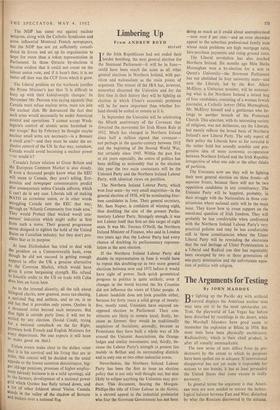Limbering Up
From ANDREW BOYD
BELFAST
F the Irish Republicans had not ended their 'border bombing, the next general election for the Stormont Parliament—it will be in June— could have been much the same as all other general elections in Northern Ireland, with par- tition and nationalism as the main points of argument. The retreat of the IRA has, however, somewhat disarmed the Unionists and for the first time in their history they will be fighting an election in which Ulster's economic problems will be far more important than whether Ire- land should be united or remain as it is.
In September the Unionists will be celebrating the fiftieth anniversary of the Covenant that thwarted the movement for Irish Home Rule in 1912. Much has changed in Northern Ireland since half a million signed that covenant— not perhaps in the quarter-century between 1912 and the beginning of the Second World War, but certainly since 1945. Within the past five or six years especially, the centre of politics has been shifting so noticeably that in the election this year the two main contestants will be the Unionist Party and the Northern Ireland Labout Party, with identical views on partition.
The Northern Ireland Labour Party, which won four seats—by very small majorities—in the general election of 1958, will be nominating four- teen candidates in June. Their general secretary, Mr. Sam Napier, is confident of winning eight, thus doubling the size of the present Parlia- mentary Labour Party. Strangely enough, it was not Labour itself that first set this target of eight seats. It was Mr. Terence O'Neill, the Northern Ireland Minister of Finance, who said in London two years ago that the Labour Party had every chance of doubling its parliamentary .represen- tation at the next election.
If the Northern Ireland Labour Party did double its representation in June it would have to repeat this doubling-up in two more general elections between now and 1972 before it would have sight of power. Such quick geometrical progress in politics is quite unlikely, even if changes in the world beyond the Six Counties did not influence the views of Ulster people. A Labour landslide does not look possible either, because for forty years a solid group of twenty- five, mostly rural, Unionists have enjoyed un- opposed election to Parliament. Their con- stituents are likely to remain loyal; firstly, be- cause as farmers they would be traditionally suspicious of Socialism; secondly, because as Protestants they have built a whole way of life around the Unionist Associations, the Orange lodges and similar movements; and, thirdly, be- cause the Labour Party's strength at present lies mainly in Belfast and its surrounding districts and in only one or two other industrial towns.
Nevertheless, the Northern Ireland Labour Party has been the first to issue an election policy that is not only well thought out, but also likely to eclipse anything the Unionists may pro- duce. This document, bearing the Morgan- Phillips-like title of Ulster Labour in the Sixties, is a shrewd appeal to the industrial proletariat who fear the Stormont Government has not been doing as much as it could about unemployment —now over 8 per cent.-L-and an even shrewder appeal to the suburban professional family man whose main problems are high mortgage rates, hire-purchase payments and rising ground rents.
The Liberal revolution has also reached Northern Ireland. Six months ago Miss Sheila Murnaghan won a by-election for a seat in Queen's University—the Stormont Parliament has not abolished its four university seats—and now the Liberals, led by the Rev. Albert McElroy, a Unitarian minister, will be nominat- ing what is for Northern Ireland a mixed bag of four candidates, consisting of a woman Jewish journalist, a Catholic lawyer (Miss Murnaghan), Mr. McElroy himself and a gentleman who be- longs to another branch of the Protestant Church. This selection, with its interesting variety of religions, was not deliberate, say the Liberals, but merely reflects the broad basis of Northern Ireland's new Liberal Party. The only aspect of their policy the Liberals have so far revealed is the rather bold but soundly sensible and pro- gressive idea of more economic co-operation between Northern Ireland and the Irish Republic irrespective of what one side or the other thinks of partition.
The Unionists now see they will be fighting their next general election on three fronts—all separate fronts, because there will not be two opposition candidates in any constituency. The Unionist Party will be happiest, probably, in their struggle with the Nationalists in those con- stituencies where national unity will be the main issue. They know how to rouse support on the emotional question of Irish freedom. They will probably be less comfortable when confronted with the Northern Ireland Labour Party's very practical policies and may be less comfortable still in those constituencies where the Ulster Liberal Party will be reminding the electorate that the real heritage of Ulster Protestantism is a, Liberal and Radical one that has regrettably been swamped by two or three generations of one-party domination and the unfortunate equa- tion of politics with religion.






































 Previous page
Previous page